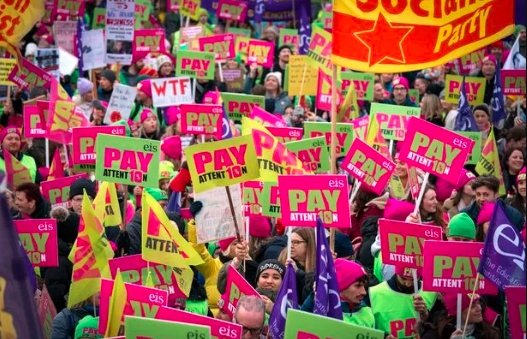Why are school staff striking?
- School staff in Scotland are members of Unison, a trade union that represents public service workers.
- Unison members rejected a pay deal from Cosla, the council body that negotiates with local government workers, that was accepted by other unions.
- Unison says the pay deal amounts to a real-terms pay cut and does not reflect the value and contribution of school staff.
- Unison wants a decent wage rise and a minimum rate of pay of £15 per hour for all local government workers.
How is the strike affecting schools and nurseries?
- The strike on Wednesday is part of a rolling programme of action, Unison says, with fresh action also taking place on Wednesday November 8 across four more regions.
- The strike affects non-teaching staff at dozens of schools and nurseries, such as classroom assistants, janitors, catering staff, and technicians.
- The strike causes disruption for parents and students, as some schools and nurseries have to close or reduce their services.
- The strike also puts pressure on teachers and headteachers, who have to cope with the absence of support staff.

What is the response from Cosla and the Scottish Government?
- Cosla says it has secured additional funding from the Scottish Government of £94m in order to make an extremely strong revised pay offer.
- Cosla says the new offer represents a minimum wage increase of £2,006 for those on the Scottish Government’s living wage and a minimum increase of £1,929 for workers who are earning above the living wage.
- Cosla says it is disappointed that Unison members have rejected the offer and decided to strike, as it believes the offer is fair and reasonable.
- The Scottish Government says it has provided record levels of funding to local authorities and expects them to deliver fair pay deals for their workers.
What are the demands and expectations of Unison?
- Unison says it is committed to reaching a resolution to the dispute as soon as possible and urges Cosla and the Scottish Government to get back to the negotiating table.
- Unison says it wants to see a pay offer that reflects the cost-of-living crisis and the dedication of school staff, who have worked hard during the pandemic.
- Unison says it also wants to see a commitment to implementing a minimum underpinning rate of pay of £15 per hour for all local government workers, as part of a wider campaign for fair pay across the public sector.
- Unison says it has the support of its 91,000 local government members, who voted overwhelmingly to reject Cosla’s latest pay offer.
What will happen next?
- The strike on Wednesday is likely to be followed by more strikes on November 8 and possibly beyond, unless a breakthrough is reached between Unison, Cosla, and the Scottish Government.
- The strike will continue to affect schools and nurseries across Scotland, causing inconvenience and uncertainty for parents and students.
- The strike will also highlight the plight and importance of school staff, who play a vital role in supporting education and learning.
- The strike will test the resolve and willingness of both sides to find a compromise and end the dispute.


















